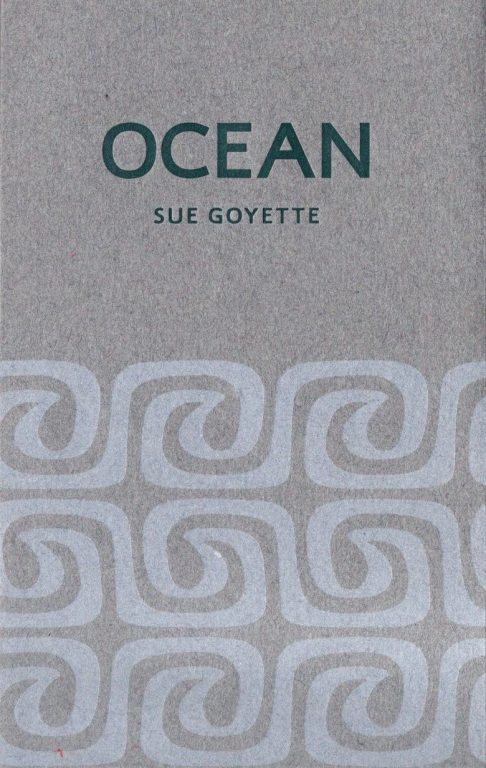
Sue Goyette has published a novel and ten books of poems, including The Brief Reincarnation of a Girl, Penelope, Monoculture, and Ocean (for which she was shortlisted for the 2014 Griffin Poetry Prize and awarded the 2015 Lieutenant Governor of Nova Scotia Masterworks Arts Award). Her work has been translated into French, Spanish and German and has been featured in films, subways, buses, spraypainted on sidewalks, and tattooed. She has won several national awards including the Pat Lowther Memorial Award, the Atlantic Poetry Prize, the Bliss Carman Award, and the CBC Literary Prize for Poetry. She lives in Halifax (K’jipuktuk) where she teaches creative writing at Dalhousie University.

Judges’ Citation
Sue Goyette’s Ocean is a capacious and ambitious book in which she does no less than re-write the sea and the history of our relationship with it.
Sue Goyette’s Ocean is a capacious and ambitious book in which she does no less than re-write the sea and the history of our relationship with it. The individual poems are numbered from one to fifty-six, not named, as is exactly right for the way the book itself ebbs and flows. In Ocean, Goyette becomes the spokesperson for a mythical community of shore-dwellers, with the third person ‘we’ in every poem bringing the strength of the collective to the viewpoint, and a refreshing sense of poetry as a communal force rather than an individual plaint. The ocean is its own character – or characters – a pet, a starlet, a dragon, a pacing old man. The poems explore the idea of its depth and surfaces, the fear of the under-ocean, the nature and origin of saltiness. But even though the sea is a constant – sometimes more present, sometimes less, a tidal flow within the poems – Goyette’s focus is on the shore. Her interest is in the moving boundary between ocean and land, where the shore-dwellers live. Here is a place of change and myth-making, where transformation happens every day. In Ocean, Goyette’s vigorous language and large vision create an extraordinary new history of the way the sea has formed human consciousness, shoreline experience and poetry itself.
Selected poems
by Sue Goyette
We first invented running so we could be in two places
at one time but then understood how, with empty pockets,
we could also harvest the wind. We invented hospitality
to lure our successes home, and to get love a much-needed
drink. We invented chairs so we could rest after the chase.
We invented the chase after we invented running, and inadvertently,
robbery. We invented the suburbs after accidentally colliding
into the feud and its conniving stepsisters the argument
and the snit. Some of us needed more space.
We discovered death under the bridge
and someone insisted we take it home, that it needed
our help. That day alone we invented the handkerchief
and the whisper. When it sat up, when it looked at us
with the teeth of its appetite puddinged in its eyes, we discovered
the flapping of words trying to escape from our ears
and something hammering in the silver-shaft of our hearts.
We unearthed fear that day, our first act of real
archeology. Understand, at that point, maps charted roads
and the humble footpaths between rumours crooked
with love. The ocean took up the most room
with its tidal pull and tentacled beasts inventing
their own recipes. Some days we knew we were nothing
but ingredients; other days we felt like honoured guests.
But the day we brushed the dirt from fear’s forehead
and got a look at its hands, well, our maps changed
and the ocean got bigger, our nights, a great deal beastier.
Copyright © 2013, Sue Goyette, Ocean, Gaspereau Press
Four
The trick to building houses was making sure
they didn’t taste good. The ocean’s culinary taste
was growing more sophisticated and occasionally
its appetite was unwieldy. It ate boats and children,
the occasional shoe. Pants. A diamond ring.
Hammers. It ate promises and rants. It snatched up
names like peanuts. We had a squadron of cooks
specifically catering to its needs. They stirred vats
of sandals and sunglasses. They peppered their soups
with pebbles and house keys. Quarts of bottled song
were used to sweeten the brew. Discussions between
preschool children and the poets were added
for nutritional value. These cooks took turns pulling
the cart to the mouth of the harbour. It would take four
of them to shoulder the vat over, tipping the peeled
promises, the baked dreams into its mouth.
And then the ocean would be calm. It would sleep. Our mistake
was thinking we were making it happy.
Copyright © 2013, Sue Goyette, Ocean, Gaspereau Press
Eight
Some believed the ocean wasn’t always salty but that our ancestors
had been very sad. They’d been promised a great many things
only to have the fruit drop and their breasts sag. They cried
a lot. When they looked up and bemoaned their fate,
claiming they’d done nothing to deserve all of this roadkill,
the exhaust from their undeservedness formed a talk show
of rain clouds. When they looked upon the ground
and beseeched their feral happiness to stop chewing
at their feet, their displeasure seeded gout weed and prehistoric
thorned things. In this way, our boats were the original forms
of escape and self-help. At first we floated on our ancestors’ sadness,
the waters rife with the salt of their tears, but then,
vivre l’evolution, those tears sprouted gills and tails
and small, watchful eyes. It isn’t entirely accurate to say
we ate those fish but more like accepted that which we’d inherited.
What we hadn’t anticipated was how the eyes of those original tears
would persist, how they’d keep watching.
Copyright © 2013, Sue Goyette, Ocean, Gaspereau Press
Eighteen
Souls became the perfect distraction. We had to keep
their gowns clean. We had to buff their moods.
But some of us were wounded in a way that made our days
need crutches. We were invalids in the pale hospital hours
of our kitchens. No one had warned us that our children
would leave and we were bereft, holding up the bedclothes
of their childhood and breathing deep the pink lambs
of their voice. We had no choice but to seal the poets’ trap
of sugared words and meet at the ocean. Bravely, we tried
reciting them without sounding desperate. That our souls
were grazing on the hill behind us no longer mattered.
We wanted to lure our wandering children home.
The words we used had the thin syrup of our loneliness
in their veins. In this way, we learned that words also have souls,
and when the souls of our words escaped, there was a glitter
frosting the ocean, and briefly, we had managed to sugar its tide.
Copyright © 2013, Sue Goyette, Ocean, Gaspereau Press
Thirty-Eight
- Author Profile Gaspereau Press
- Of Re-writing, Reclamation, and Unredacting: An Interview with Sue Goyette The Ex-Puritan
- An Interview with Sue Goyette The Fiddlehead